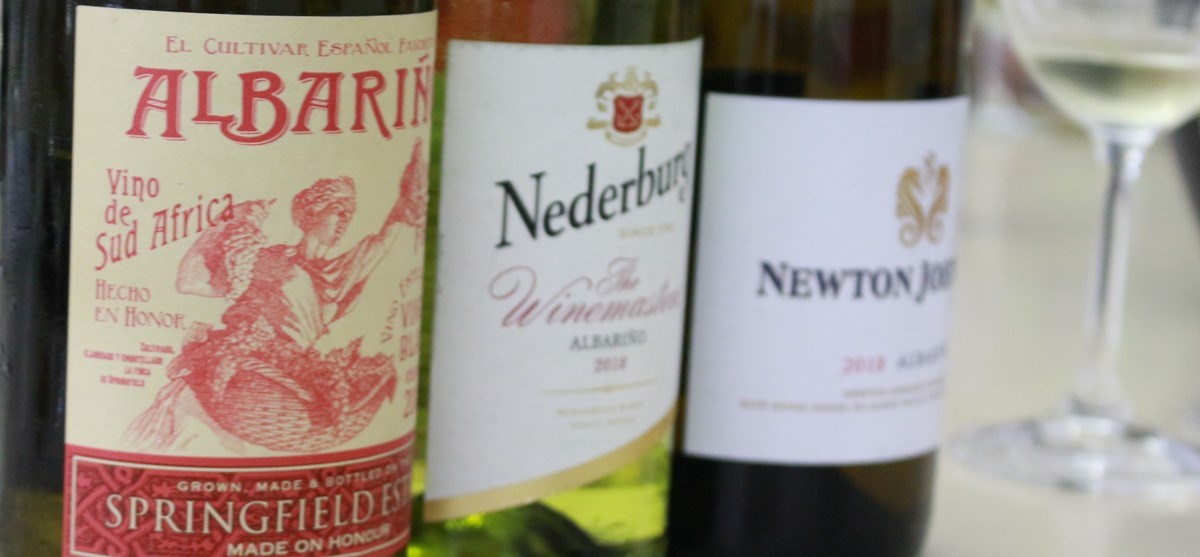Global warming has brought massive climate changes and extreme weather conditions across the continent, and we have first hand experience here with the drought in the Western Cape. So when looking into some unusual varieties planted in the South African Winelands and coming across Albariño, I thought that the climate issue would be the reason behind the plantings, but not entirely so!
Abrie Bruwer and his sister Jeanette visited Uruguay about 9 years back and when their guest house was not quite yet ready for them, they were directed to a coffee shop to wait, but being afraid of the late afternoon caffeine kick, they enjoyed a lovely white wine which piqued their interest and the cultivar, of course, was Albariño. This was entirely new to them and they were so keen on it that their investigations led them to wanting to bring it to South Africa. The Bruwers only plant what they like, so this is why we now have this unusual Spanish variety in Robertson.
Introducing a new cultivar is no easy task, as anyone in the industry who has done this will know - bringing in plant material is not for sissies. There are rules and regulations, red tape, quarantine and then some. Their investigations led to the discovery that Dave Newton Johnson was already in the process of having plant material in quarantine for some time, and of course planning to plant at Newton Johnson in the Upper Hemel-en-Aarde Valley near Hermanus.
Dave's son Bevan Newton Johnson explains: 'Sourcing some was challenging, we tried in Spain then Australia to finally get some from California. The paperwork was fairly challenging and getting it through quarantine at Dept of Agriculture. Finally, then getting it planted out at the nursery was time consuming. We brought in 10 cuttings, the maximum allowed by Dept of Agri, and then got it planted out to the initial planting of just over 300 plants.'
Newton Johnson have planted a total of 2.5ha and their climate should be the closest to that of the north-west Iberian Peninsula (Spain and Portugal) from whence the grape variety hails. Galicia, home of Albariño, is in the north west corner of Spain. Many will know the area for the pilgrimage destination of the Camino which famously ends here in the city of Santiago de Compostela. The weather in Galicia can be wet and the Albarino grapes grown there generally have high acidity, and have a fairly thick skin to protect them from the elements and mildew. Hemel en Aarde valley is not quite as damp and Robertson is not very wet at all, but the vineyards at Springfield are irrigated so perhaps similar water requirements. Albariño is known in Portugal as Alvarinho (in Monção and Melgaço), and sometimes as Cainho Branco and is also planted in Uruguay, where the Bruwers had their first taste of it.
I am used to hearing about vines which are only really productive after 5-7 years, but here was another surprising discovery. Springfield bottled their first vintage from babies - vines only 1.5 years old. Their first harvest (2018) yielded only 5 000 litres, (6 500 bottles - sold out of course!), their 2nd vintage 23 000 litres (30 000 bottles) from 2.5 year old vines, and their total planting of 10 hectares, (60 000 vines planted double density) it should yield about 70 000 litres (90 000 bottles) a considerable return. Abrie is a real farmer and they have a massive workshop/shed with all their customised machinery: harvesters and digger loaders... he has fun with all his machines.
My investigations into Albariño led to finding out that Nederburg was in fact the first producer to plant in 2009, but theirs is not a single variety wine, they blend theirs with Colombard (13%) with some lees contact. The wine is part of their Winemasters' Collection available at the cellar exclusively for a steal at R71 for a double gold medal from the 2018 Michelangelo International Wine & Spirits Awards.
The Newton Johnson Albariño is fermented with 40% in concrete eggs, 40% in steel tanks and 20% in old wooden foudre, They focused on the texture of the variety. So with the concrete eggs and the foudre, they encourage a lot of contact with the lees to get good mid palate texture in the wine. Cost of this wine is R170 from the cellar.
The Springfield is really fresh and zesty and was sold at R115 per bottle from the farm, (sadly sold out), but you may be lucky to find it in the market still. Watch out for the 2019 release.

WSET lecturer and wine fundi Elizma Myburgh Venter (DipWSET) joined us for our tasting and we learned plenty from her international experience and palate:
'Happy to have joined the tasting at wine.co.za to taste these wines again and how different they all were. On the nose the Springfield showed that typical aromatic floral & stone fruit characters expected from an Albariño whereas the Newton Johnson was a bit shy and the Nederburg somewhat different with some mineral character. After a while the NJ opened up and was pleasantly surprising, showing aromas of peaches, orange blossoms and lemon cream biscuits, with plenty of texture and body. Three very different wines and one for each palate. The Springfield (I LOVE the packaging!) is a very refreshing aromatic wine which will make the perfect aperitif or with fresh fish on the braai . The Nederburg which has a dash of Colombard in it as well, is a little less fruity with more mineral and canned fruit aromas, whereas the Newton Johnson definitely needs time to open up in your glass while watching the sunset or with a great seafood meal.